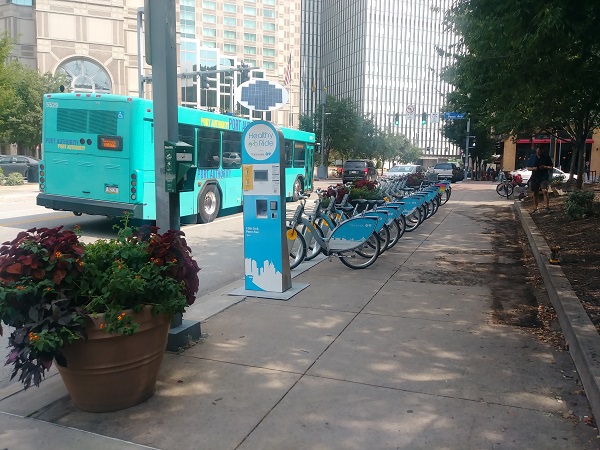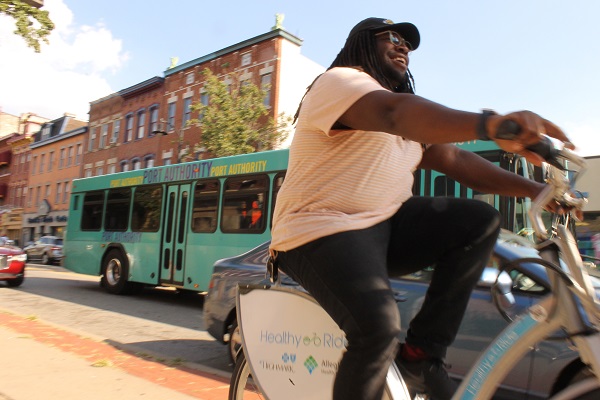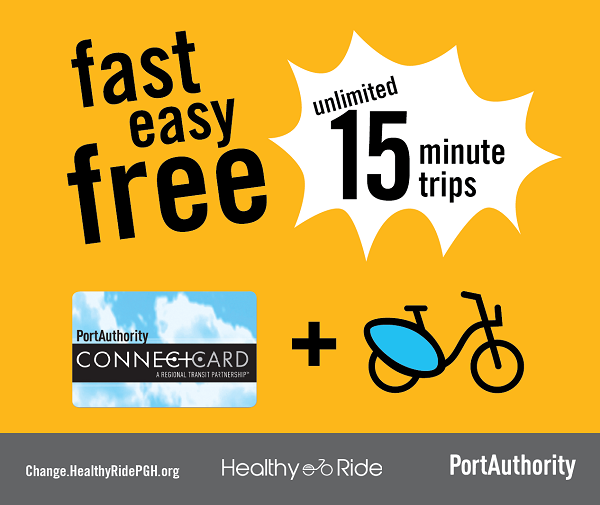Pittsburgh becomes first U.S. city to offer free bike share to transit riders
by Stefani Cox
October 6, 2017
We’ve talked a lot about bike share discount programs, but Pittsburgh is now offering an entirely free ride to anyone with a transit card.
Last Thursday, Pittsburgh’s bike share program Healthy Ride announced the first six months of the project, where those who own the regional transit system’s ConnectCard can access bike share for free in 15-minute increments.
Coordinated technology paves the way
The integration of the bike share with other transit systems is made possible due to a shared technology system. Each bike is equipped with an RFID reader that uses near-field communication to deduct from the stored value on a card — the same mechanism is used for accessing local buses, light rail, and the funicular network.
Making the sign-up process as easy as possible was of key importance to those that designed the program.
“We’re doing it without requiring any registration on the customer’s part,” said David White, Executive Director of Healthy Ride.
To access the free 15 minutes of ride time, all an individual has to do is tap their ConnectCard on a bike share kiosk, input their phone number, and use the PIN number texted to their phone to access the bike. After the first use, the ConnectCard is linked to bike share, and all that is required is to tap the card on the desired bike.
There’s currently no limit on how many free rides can be taken. Someone could theoretically use the bikes all day, as long as they made sure to check the bike back in every 15 minutes. If someone does exceed their 15 minutes of free ride time, they will get a text asking them to register and pay for the overage before continuing to use the system.
Dreaming big for bike share
Such a bold step for bike share requires a big vision and a comfort with the experimentation process — both qualities that White possesses.
White notes that it is a bit of a risk to offer free rides to transit passholders without having much information on them. But it’s a risk that he is comfortable taking.
“The first phase is to prove that this tech exists and works and that we can have integration with transit. We want to show that bike share and transit are not competitors,” said White. “At the same time, we are analyzing the revenue impacts from our side. We plan to do a direct comparison of revenue we lose from people who are currently paying for our system who can now access it for free, versus how many new customers we gain by having people try the 15 minutes — those who complete their payment profile and move on to additional rides.”
When asked about equity, and whether this program will help low-income riders access bike share, White said that equity principles underlie the entire program. The ability to use the existing transit card (which can be reloaded with cash), along with the free ride time, he hopes will be a big step forward in making the system truly accessible to all.
Ultimately White would love to secure funding to keep the program going, and perhaps to eventually expand the duration of free ride time from 15 to 30 minutes.
Support from the bike advocacy community
Healthy Ride staff themselves aren’t the only ones excited about the free ride program.
Bike PGH is the area’s bicycle advocacy organization, which originally worked to bring Healthy Ride to Pittsburgh in the first place.
“For over a decade, we’ve been trying to make that connection between biking and transit,” said Eric Boerer, Advocacy Director for Bike PGH. “We view bike share as public transit, and the free ride program is helping to make that happen. It especially helps address first mile, last mile connectivity.”
As an advocate, Boerer sees potential for the program to promote bicycling infrastructure throughout the city, as well as unity across local government and regional government institutions. The Port Authority, for example, generally manages transit, and the City manages bus stations and other infrastructure. Boerer mentioned that both the mayor and county executives were present at the press meeting to announce the free bike share ride program.
Of bike share itself, Boerer has optimism for a long future. “It’s really cool to see it all over the place,” he said. “People are really figuring out how to use it.”
Getting the word out on free bike share
While it’s too early to draw any conclusions about the success of the program, White noted that as of this Tuesday, about 100 people had linked their ConnectCard to bike share. All of those who linked their card then went on to actually ride a bike.
White said that by the end of this week, all 50 bike share stations should be on-line with the ability to link to the ConnectCard.
“The goal is to introduce people to the system without any cost to see how easy it is to get involved,” said White.
Healthy Ride has been advertising the free program on buses, at bus stations, and on the bike share kiosks themselves. The promotions feature suggestions for where to ride bike share, such as the baseball stadium or the South Side business district.
The free program comes ahead of a planned 2018 bike share system expansion, which will add 20 stations, a 40 percent increase overall. The expansion will include three lower-income neighborhoods that have been traditionally underserved by public transit.
The Better Bike Share Partnership is funded by The JPB Foundation as a collaborative between the City of Philadelphia, the Bicycle Coalition of Greater Philadelphia, the National Association of City Transportation Officials (NACTO) and the PeopleForBikes Foundation to build equitable and replicable bike share systems. Follow us on Facebook, Twitter and Instagram or sign up for our weekly newsletter. Story tip? Write stefani@betterbikeshare.org.



